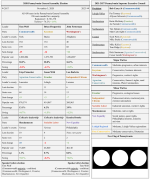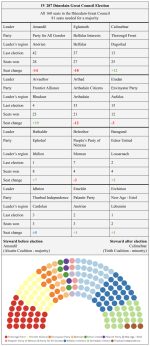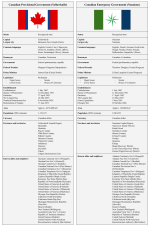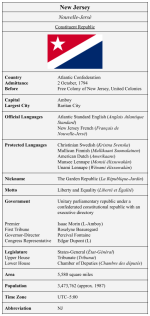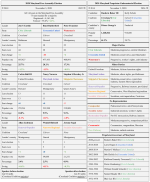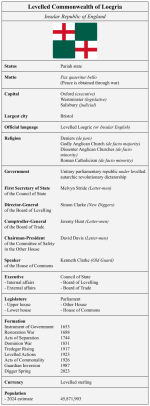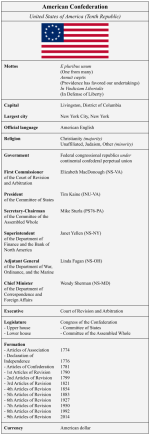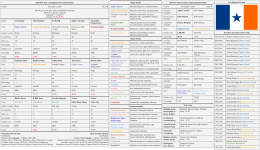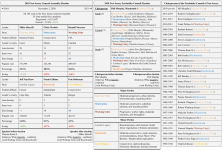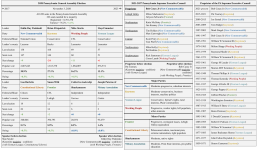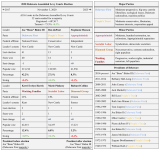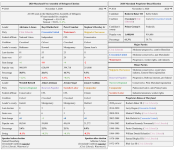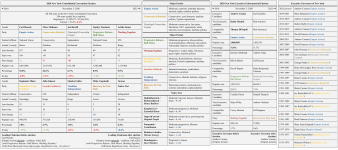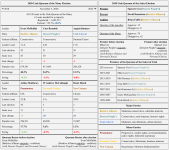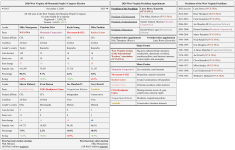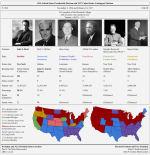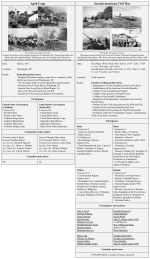Veranius
Member
- Location
- Susquehanna-Hudson-Potomac Region
- Pronouns
- he/him
Well, let's get this going shall we?
The 2022 United States Congressional Elections were held on November 7th, 2022, to elect all 800 members of the United States Continental Congress from all 51 states for a four year term.
In the 2018 Congressional Elections, Conservatives under John Kasich were able to claim an impressive 290 seats, ending twelve years of Liberal-Alliance control and ending the series of the so-called Bay Premiers (John Kerry, Joe Biden, and Tim Kaine). Predictions for an outright majority for the Conservatives were stymied by higher than anticipated support for the Moderates, as well as the fracturing of the Liberal caucus with a sudden surge of Progressive support. Thus, Kasich was forced to work with Susan Collins, leader of the Moderates, to produce a working coalition majority. The Kasich premiership was embattled from the start with rising far-right tensions within the Conservatives, and his selection as party leader only came about through the split of support amongst numerous far-right candidates, allowing him to sail through with a plurality. These tensions would come to a head in 2020 when, in reaction to the imposition of nation-wide lockdowns to halt the ongoing 2019 coronavirus pandemic, massive protests against said lockdowns shook the nation to its core. Simultaneous protests against police brutality and racial injustice exacerbated tensions, tensions that Kasich was unable to cool down. The successful invention and rollout of three coronavirus vaccines did little to improve Kasich's popularity amongst the people and amongst members of Congress, and he was forced to work more and more with Moderates and even Liberals to get even simple legislation passed.
Much like the left of US politics fractured with the massive rise of support of the Progressives in 2014, the right fell apart in 2022 with the formation of the Nationals and Constitution. The Conservatives, once the most solid with inter-party unity, suffered their biggest losses in recent history, with most stemming from defections, and the rest from vote splitting between several conservative candidates, thus allowing for non-conservatives to triumph. However, Liberal hopes were dashed when their seat gain ended up being far less than anticipated, due to ongoing popular dissatisfaction with the Liberal leadership, despite Cory Booker achieving victory as the leader of the Liberals. Still, Booker was able to easily work out a deal with Michelle Wu of the Progressives, Beto O'Rourke of Reform, and Deb Haaland of Alliance, thus establishing a working majority.
The 2022 United States Congressional Elections were held on November 7th, 2022, to elect all 800 members of the United States Continental Congress from all 51 states for a four year term.
In the 2018 Congressional Elections, Conservatives under John Kasich were able to claim an impressive 290 seats, ending twelve years of Liberal-Alliance control and ending the series of the so-called Bay Premiers (John Kerry, Joe Biden, and Tim Kaine). Predictions for an outright majority for the Conservatives were stymied by higher than anticipated support for the Moderates, as well as the fracturing of the Liberal caucus with a sudden surge of Progressive support. Thus, Kasich was forced to work with Susan Collins, leader of the Moderates, to produce a working coalition majority. The Kasich premiership was embattled from the start with rising far-right tensions within the Conservatives, and his selection as party leader only came about through the split of support amongst numerous far-right candidates, allowing him to sail through with a plurality. These tensions would come to a head in 2020 when, in reaction to the imposition of nation-wide lockdowns to halt the ongoing 2019 coronavirus pandemic, massive protests against said lockdowns shook the nation to its core. Simultaneous protests against police brutality and racial injustice exacerbated tensions, tensions that Kasich was unable to cool down. The successful invention and rollout of three coronavirus vaccines did little to improve Kasich's popularity amongst the people and amongst members of Congress, and he was forced to work more and more with Moderates and even Liberals to get even simple legislation passed.
Much like the left of US politics fractured with the massive rise of support of the Progressives in 2014, the right fell apart in 2022 with the formation of the Nationals and Constitution. The Conservatives, once the most solid with inter-party unity, suffered their biggest losses in recent history, with most stemming from defections, and the rest from vote splitting between several conservative candidates, thus allowing for non-conservatives to triumph. However, Liberal hopes were dashed when their seat gain ended up being far less than anticipated, due to ongoing popular dissatisfaction with the Liberal leadership, despite Cory Booker achieving victory as the leader of the Liberals. Still, Booker was able to easily work out a deal with Michelle Wu of the Progressives, Beto O'Rourke of Reform, and Deb Haaland of Alliance, thus establishing a working majority.



